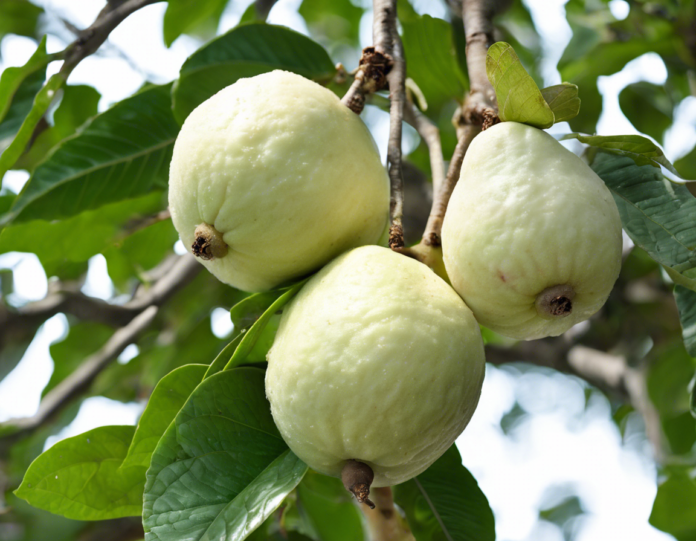Introduction
When it comes to tropical fruits, white guava might not be the first that comes to mind, but it is a true gem that offers a unique and delicious flavor experience. White guava, also known as Mexican guava or tropical white guava, is a tropical fruit that is gaining popularity for its sweet, aromatic, and mildly acidic taste. Originally native to Central America, white guava is now grown in various tropical and subtropical regions around the world. In this article, we will explore the wonderful world of white guava, including its flavor profile, nutritional benefits, culinary uses, and more.
Flavor Profile and Characteristics of White Guava
White guava has a distinct flavor profile that sets it apart from other guava varieties. The fruit is typically medium to large in size with a greenish-white skin and creamy white flesh that is dotted with small seeds. When ripe, white guava exudes a sweet and floral aroma that is both captivating and inviting.
The flavor of white guava can be described as a delicate balance between sweetness and acidity. It has a rich, tropical sweetness with subtle notes of citrus and pear, making it a delightful treat for the taste buds. The flesh is juicy and tender, and the seeds are edible, adding a bit of crunch to each bite.
Nutritional Benefits of White Guava
Aside from its delectable taste, white guava is also packed with essential nutrients that can benefit your health. Here are some of the nutritional highlights of white guava:
-
Vitamin C: White guava is an excellent source of vitamin C, providing more than 200% of the recommended daily intake in a single fruit. Vitamin C is a powerful antioxidant that helps boost the immune system, promote healthy skin, and support overall health.
-
Dietary Fiber: White guava is rich in dietary fiber, which aids in digestion, promotes satiety, and helps maintain a healthy weight.
-
Vitamin A: White guava is a good source of vitamin A, which is essential for vision health, immune function, and cell growth.
-
Potassium: White guava contains potassium, an important mineral that helps regulate blood pressure, support muscle function, and maintain fluid balance in the body.
-
Antioxidants: White guava is loaded with antioxidants, including flavonoids, carotenoids, and polyphenols, which help protect the body from oxidative stress and inflammation.
Culinary Uses of White Guava
White guava is a versatile fruit that can be enjoyed in a variety of ways. Here are some delicious ways to incorporate white guava into your culinary creations:
-
Fresh: Enjoy white guava fresh on its own or sliced and added to fruit salads for a refreshing and nutritious snack.
-
Smoothies: Blend white guava with other tropical fruits like mango, pineapple, and coconut water for a tropical and energizing smoothie.
-
Sauces and Salsas: Use white guava to make sweet and tangy sauces or salsas that pair well with grilled meats, seafood, or tacos.
-
Desserts: White guava can be used to make jams, jellies, or desserts like pies, tarts, and sorbets for a sweet and tropical treat.
-
Beverages: White guava can be juiced or pureed and added to cocktails, mocktails, or infused water for a flavorful twist.
Growing White Guava
If you’re interested in growing your own white guava tree, here are some tips to help you get started:
-
Climate: White guava thrives in tropical and subtropical climates with warm temperatures and plenty of sunlight.
-
Soil: Plant white guava in well-draining soil that is rich in organic matter. The pH level should be around 5.0 to 7.0 for optimal growth.
-
Watering: White guava trees require regular watering, especially during dry periods. Make sure the soil is moist but not waterlogged.
-
Pruning: Prune your white guava tree to remove dead or damaged branches, encourage airflow, and promote fruit production.
-
Fertilization: Fertilize your white guava tree with a balanced fertilizer during the growing season to promote healthy growth and fruit development.
FAQs
- Is white guava the same as pink guava?
-
No, white guava and pink guava are different varieties of guava. White guava has greenish-white skin and creamy white flesh, while pink guava has pinkish-red skin and bright pink flesh.
-
How do I know when white guava is ripe?
-
Ripe white guava will give slightly to gentle pressure and have a fragrant aroma. The skin may also turn slightly yellow when ripe.
-
Can I eat the seeds of white guava?
-
Yes, the seeds of white guava are edible and can be consumed along with the flesh. They have a crunchy texture and are packed with nutrients.
-
Are there any health benefits to consuming white guava?
-
Yes, white guava is a nutritious fruit that is rich in vitamin C, fiber, antioxidants, and other essential nutrients that can support overall health and well-being.
-
Can I grow white guava in a pot or container?
- Yes, white guava can be grown in a pot or container as long as it has sufficient space, sunlight, and proper drainage. Be sure to choose a large enough container to accommodate the roots.
In conclusion, white guava is a delightful tropical fruit that offers a unique flavor experience, nutritional benefits, and culinary versatility. Whether enjoyed fresh, blended into smoothies, or used in savory dishes and desserts, white guava is sure to add a touch of tropical goodness to your meals. Consider adding white guava to your fruit repertoire for a tasty and wholesome addition to your diet.





